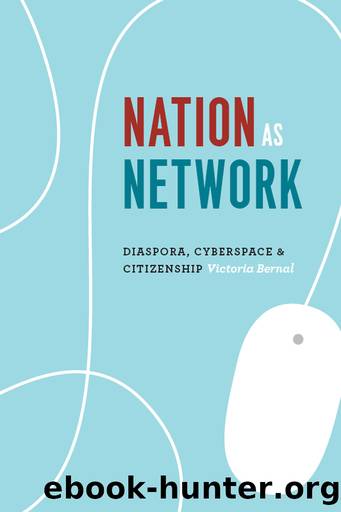Nation as Network by Victoria Bernal

Author:Victoria Bernal [Bernal, Victoria]
Language: eng
Format: epub
Tags: Computers, Internet, Social Media, History, Africa, North, Social Science, General, Anthropology, Cultural & Social, Emigration & Immigration, Sociology
ISBN: 9780226144818
Google: TC2OBAAAQBAJ
Publisher: University of Chicago Press
Published: 2014-08-19T04:05:38+00:00
CHAPTER 4
Mourning Becomes Electronic: Representing the Nation in a Virtual War Memorial
[W]e believe that a big portion of the Eritrean culture glorifies warriors. However, at the same time, the Eritrean culture considers life very precious. One indicator is the grieving process in Eritrea. In some traditions, the dead are mourned for forty days and forty nights. Even people of very modest means spare no resources to pay their respects. There has been a great deal of criticism of the âexcessâ of this tradition; now, however, we have reverted to an opposite extreme where we are supposed to âululateâ and celebrate the deadâbut not mourn them. Each hero listed in the Martyrâs Album, each number represented in the statistics represents a loss of Eritreaâa loss that should be mourned and grieved by all of us.âThe Awate team
(Awate post, January 16, 2005)
In 2005 a virtual national war memorial, called the Martyrs Album, was established on awate.com. The unauthorized memorial used leaked government records to commemorate and document the Eritrean lives lost in the 1998â2000 border war with Ethiopia. The Martyrs Album is a prime example of the ways that the internet facilitates political experimentation and makes possible the development of novel forms of political engagement that have no off-line counterpart. This online memorial represents a creative form of political protest. In this chapter I explore how Eritreans in diaspora used digital media to act on behalf of the nation as a surrogate for the state, and in so doing, seized infopolitical power from the state.
This act of commemoration by the Awate team reminds us that losses, absences, deaths, and displacement are not simply sources of human suffering, but are generative of identities, social relations, and subjectivities (Feldman 1991; Theidon 2013; Bay and Donham 2006). Eritreans are defined to a great extent by their losses and shared sacrifices. The war memorial is important because all Eritreans are essentially survivors whose lives and families have been irrevocably harmed by decades of war fought on Eritrean soil. Eritreansâ connections to the nation have been constructed through compelling narratives in which martyrs are accorded a central role. Martyrs, as I have argued, are a potent national symbol deployed by the state to exact sacrifices from Eritreans, a symbol that I argue represents the social contract of sacrificial citizenship between citizens and the Eritrean state.
From the early 1990s until today Eritreans in diaspora have used the internet not simply to discuss or observe national politics, but to actively participate. The Martyrs Album is a distinct intervention, however, because the diaspora used the internet to act like the state and carry out statelike responsibilities. In the pages of the memorial the Awate team emulates state practices, wielding the stateâs own symbols, rhetoric, and national narratives as info political weapons to decenter the state. The establishment of the war memorial on Awate, thus, stands as another element of the transformations described in this book in which the Eritrean diaspora has gone from using the internet as an arm of
Download
This site does not store any files on its server. We only index and link to content provided by other sites. Please contact the content providers to delete copyright contents if any and email us, we'll remove relevant links or contents immediately.
american english file 1 student book 3rd edition by Unknown(611)
Phoenicians among Others: Why Migrants Mattered in the Ancient Mediterranean by Denise Demetriou(608)
Verus Israel: Study of the Relations Between Christians and Jews in the Roman Empire, AD 135-425 by Marcel Simon(595)
Caesar Rules: The Emperor in the Changing Roman World (c. 50 BC â AD 565) by Olivier Hekster(580)
Basic japanese A grammar and workbook by Unknown(576)
Europe, Strategy and Armed Forces by Sven Biscop Jo Coelmont(521)
Give Me Liberty, Seventh Edition by Foner Eric & DuVal Kathleen & McGirr Lisa(499)
Banned in the U.S.A. : A Reference Guide to Book Censorship in Schools and Public Libraries by Herbert N. Foerstel(492)
The Roman World 44 BC-AD 180 by Martin Goodman(478)
Reading Colonial Japan by Mason Michele;Lee Helen;(469)
DS001-THE MAN OF BRONZE by J.R.A(462)
The Dangerous Life and Ideas of Diogenes the Cynic by Jean-Manuel Roubineau(456)
Introducing Christian Ethics by Samuel Wells and Ben Quash with Rebekah Eklund(456)
Imperial Rome AD 193 - 284 by Ando Clifford(454)
The Oxford History of World War II by Richard Overy(454)
Catiline by Henrik Ibsen--Delphi Classics (Illustrated) by Henrik Ibsen(427)
Language Hacking Mandarin by Benny Lewis & Dr. Licheng Gu(411)
Literary Mathematics by Michael Gavin;(408)
Brand by Henrik Ibsen--Delphi Classics (Illustrated) by Henrik Ibsen(390)
